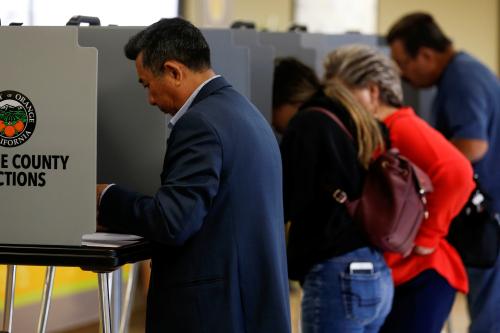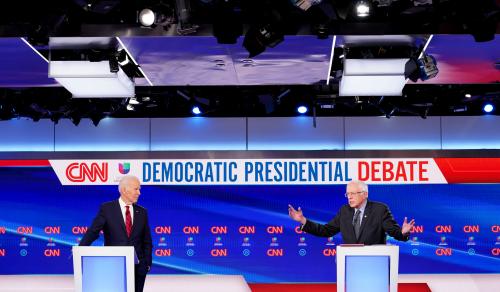Although it has received less attention, Trump’s waning support among women with less than a college degree may prove just as important as his eroding support among older voters.
As far back as the 2018 midterm elections, commentators began suggesting that support for Trump was dwindling among white non-college women. The latest ABC/Washington Post survey shows that this shift may be intensifying. Although support for President Trump among non-college men stands at 71%, as high as it was four years ago, his support among non-college women has fallen by 11 percentage points, from 61% to just 50%, the poll finds. Hillary Clinton lost this group to Donald Trump by 27 points in 2016. Today, Joe Biden trails him by just 6. If this pattern were to persist through November, it is hard to see how the president could win reelection.
As Table 1 shows, support for Democratic candidates rose equally and across the board between 2016 and 2018. The 2018 results reflected a highly mobilized Democratic base coupled with lower turnout in a Republican electorate disappointed by their party’s failure to repeal the Affordable Care Act—an enthusiasm gap unlikely to repeat itself in 2020, when Trump would once again be on the ballot.
Table 1: White voters by education and gender
| 2016 | 2018 | |||
| Trump | Clinton | Republican | Democrat | |
| White college women | 44 | 51 | 39 | 59 |
| White non-college women | 61 | 34 | 56 | 42 |
| White college men | 53 | 39 | 51 | 47 |
| White non-college men | 71 | 23 | 66 | 32 |
Source: McClatchy summary of CNN Exit Polling
Against the backdrop of symmetrical Democratic gains in 2018 across lines of gender and education, the Washington Post’s finding of huge losses for President Trump among white non-college women stands out sharply. Moreover, the Post’s survey helps us see why this is happening. As Table 2 shows, an attitudinal gulf on key questions divides white non-college women from their male counterparts.
Table 2: White non-college voters by gender
| Men | Women | |
| Trump is honest and trustworthy | 61 | 39 |
| Trump understands the problems of people like you | 64 | 43 |
| Approve Trump’s handling of the COVID-19 pandemic | 71 | 51 |
| Trust Trump more than Biden to handle COVID-19 | 69 | 48 |
| Approve Trump’s handling of the economy | 72 | 53 |
| Trust Trump more than Biden to lead the economic recovery | 77 | 50 |
| Approve of Trump’s performance as president | 71 | 49 |
Source: Post/ABC National Poll
On election day, job approval ratings typically converge with voting patterns. As things now stand, President Trump is on track to receive barely half of the votes of women without college degrees, compared to the 61% he received four years ago.
Estimates of white non-college women’s share of the total electorate in 2016 range from 17 to 23 percent. If all else is equal, an 11-point reduction in Trump’s support among this group would reduce his share of the overall vote by 1.9-2.5 points in 2020, to somewhere between 43.6 and 44.2%, about where his job approval stands today and not enough to gain reelection.
Can President Trump win back these women? It won’t be easy. Focus group interviews suggest that non-college women dislike his rhetoric on immigration and are less likely than men to believe that his economic policies are working well for their families. A massive data set collected by the bipartisan Voter Study Group shows that these women are more liberal than their male counterparts across a wide range of issues, including guns, immigration, and workforce issues such as paid parental leave and a $15/hour minimum wage. And they have been hit harder than men by the pandemic-induced shutdown of the economy.
The newest poll provides further evidence for the hypothesis first put forth by Morley Winograd and Mike Hais in these pages. This past winter they wrote: “The most profound change in American politics today and in the years to come will result from a massive movement of women into the Democratic Party.”
To judge from the evidence of recent weeks, President Trump’s 2016 playbook will feature harsh attacks on his enemies, foreign and domestic. His core male supporters may well share his appetite for constant battle. His erstwhile female supporters do not. The president’s unceasing politics of division may end up driving a wedge into his own base.
The Brookings Institution is committed to quality, independence, and impact.
We are supported by a diverse array of funders. In line with our values and policies, each Brookings publication represents the sole views of its author(s).








Commentary
New polling: Eroding support from white working-class women threatens Trump’s reelection
June 3, 2020